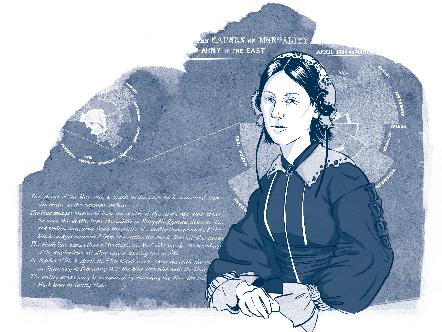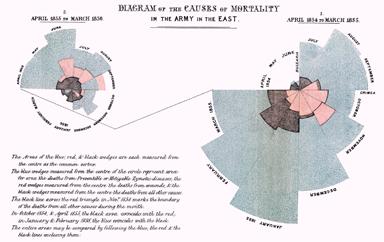
5 minute read
florence nightingale More contemporary than ever
Florence was an expert Florence Nightingale is considered to be the at presenting data in a mother of modern nursing, as creator of the first visual way to get across her conceptual model of nursing with an intersectorial, interdisciplinary and global vision. Florence was message and secure funding. born on 12 May 1820 to English parents. Such was her contribution 2020, the bicentenary of her birth, was declared by the World Health Organisation (who) to statistics that she was to be the International Year of the Nurse and the recognised by the bestowal Midwife. In the same year of such recognition, the of membership of the Royal world has seen and suffered the worst pandemic in the last few decades. Statistical Society - the first In this time of crisis, the strength and woman to gain this honour. capacity for action of nurses, pioneered by Florence Nightingale, has been put to the test at a global level. Nurses all over the world have had to find solutions to daily problems. Their observation, organisation, forward-thinking, personal and data analysis skills have been crucial in the fight against Covid. Florence Nightingale, who was from an aristocratic English family, believed that knowledge and statistical methods and instruments were key to developing concrete solutions to problems. From a young age, she showed an interest in maths, but her mother encouraged her to develop skills in the home and her father asked her to study subjects that were “more appropriate for a woman.” But Florence was persistent, and her parents ended up allowing her to study arithmetic, geometry and algebra. Florence was an expert at presenting data in a visual way to get across her message and secure funding. Such was her contribution to statistics that she was recognised by the bestowal of membership of the Royal Statistical Society – the first woman to gain this honour. She was even made an Honorary Member of the American Statistical Association. As someone with very modern ideas for the time she lived in, Nightingale had to fight against prejudice to work as a nurse, administrator, researcher, writer and teacher. She visited hospitals in many countries, such as: France, Greece, Switzerland and Egypt. These trips were her formative years. What she learnt and experienced is recorded in her travel journals and other writings. To achieve her dream of caring for the sick, she had to come up against her family, who were opposed to their daughter, a member of the aristocracy, carrying out such a “menial” task as nursing. They saw her future as getting married and bringing up a family. Surprisingly however, her life took another twist when her maternal grandmother and a doctor friend of the family gave her financial support to start her studies.
This change in her personal history was to be crucial to Great Britain and the future of healthcare. Then, from October 1853 to February 1856, war broke out between the Russian Empire and the allies, France, the United Kingdom, the Ottoman Empire and the Kingdom of Piamonte - Cerdeña (The Crimean Wars). Although the allies beat the Russians on the battlefield, sickness ate away at the British army. There were not enough doctors, medicine or nurses. Sidney Herbert, Great Britain’s War Secretary and an acquaintance of the Nightingale family, asked Florence for help. Taking with her thirty-eight volunteer nurses she had personally trained up, Florence left in October 1854 for the British operations base in Scutari, on the Crimean Peninsula. On arrival, a scene of desolation met her: an overworked medical team «Observation will show us the and wounded soldiers receiving totally patient’s condition, reflection inadequate treatment. The hygiene was will show us what we must do, deplorable. The medical care was just not sufficient to care for the sheer number of sick and practical skills will show people. Neither was there enough food or us how we must do it. Training appropriate equipment to cook food for the patients. Ten times more soldiers were dying and experience are necessary of diseases such as typhoid fever, cholera and to knowing how to observe and dysentery than from battle wounds. what to observe, how to think Just as the hospitals have done during this world health crisis, under Florence’s and what to think». direction, the hospitals in Crimea underwent a change in procedures, skills, equipment and florence nightingale, Notes on Hospitals, 1863. space. Florence ordered that contaminated waste be cleaned up, created new patient care procedures and improved ventilation in the hospitals in order to bring down the mortality rate. She succeeded so well at this task that she was received as a heroine in her own country at the end of the war. After the war, Florence promoted revolutionary ideas in patient care and public health in Great Britain and all over the world. During a long period of sickness, she passed the time writing letters to politicians and statisticians and publishing scientific articles putting forward proposals for the strengthening of military nursing training. Later, she modernised patient care training, creating a new teaching model. 1859 saw the publication of her “Notes on Nursing: What it is and What it is Not”, which was used as the basis of the study programme in the Nightingale School and other nursing schools. Florence never married: she gave her whole life to the service of others and those most in need.


↑ Diagram showing the causes of death of the army in the East, by Florence Nightingale.
Her studies led her to define sickness as nature’s way of freeing us from the effects and conditions that have interfered in our health. She believed that in order to have good health you needed a healthy environment (pure air, potable water, sewage treatment, clean quarters and light). She also put great value on feeding the human spirit, an attitude that continues to be just as important in our times. The lessons of this pandemic are still to be seen, but without a doubt Florence’s thoughts about acting in spite of fear, about facing challenges head on and trusting in hard data and, above all, her words about heroism are still important: “I am of certain convinced that the greatest heroes are those who do their duty in the daily grind of domestic affairs whilst the world whirls as a maddening dreidel”. �








